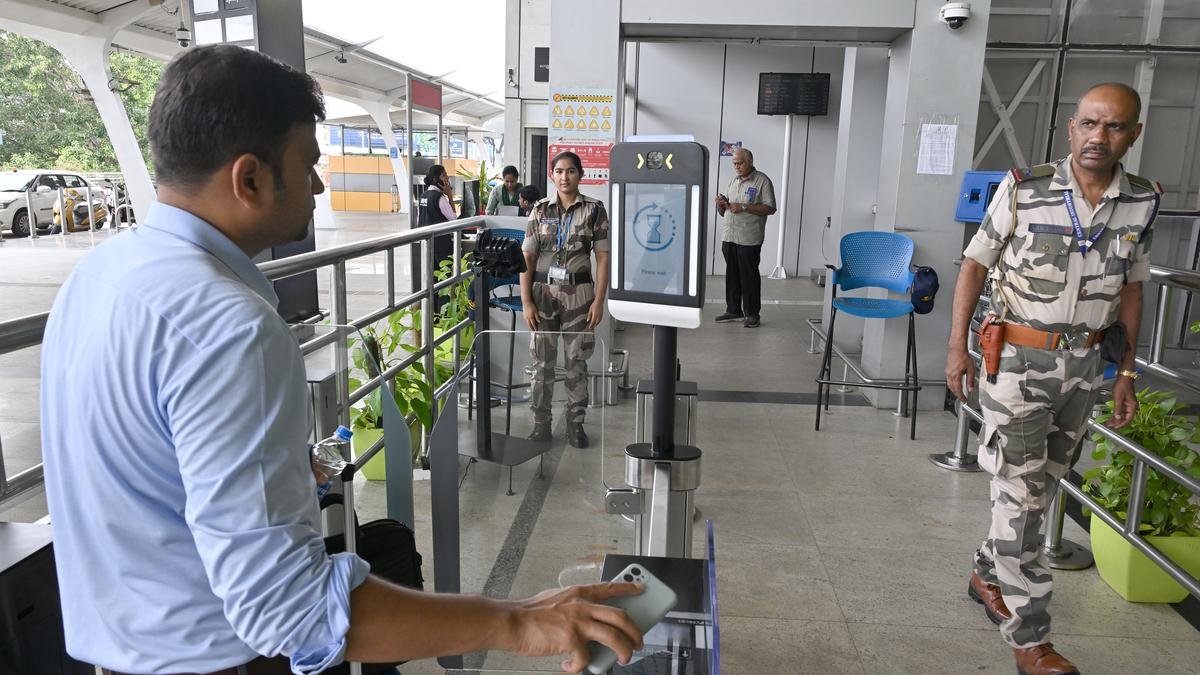
Passenger scanning of the Digi Yatra facility has been commissioned at Chennai Airport Home terminals.
| Picture Credit score: B. VELANKANNI RAJ
The facial-recognition know-how based mostly check-in service at airports, known as Digi Yatra, may very well be carried out at inns and public locations similar to historic monuments, in line with the CEO of Digi Yatra Basis, Suresh Khadakbhavi. He stated {that a} prototype for this use-case had been developed and discussions have been ongoing with numerous authorities companies such because the Ministry of Tourism.
“The imaginative and prescient is to create a journey stack for seamless motion throughout India,” Mr. Khadakbhavi stated in an unique interview with The Hindu whereas speaking concerning the future use-cases of Digi Yatra.
“This may improve the journey expertise for a vacationer who has to provide a passport for check-in at a resort and at police stations for verification,” he stated citing the instance of the Taj Mahal. Digi Yatra is also used for rail journey, and an preliminary dialogue has additionally been held with the Ministry of Railways. Nationals of sure international locations similar to Pakistan are required to report their arrival and meant departure at every place of keep inside 24 hours on the nearest police station. Vacationers of different nationalities who maintain a visa for a interval of greater than 180 days are additionally required to register on the Overseas Regional Registration Workplace (FRRO).
Mr. Khadakbhavi defined that extending Digi Yatra to inns and public locations would stop information leakage as folks usually are inclined to share unencrypted type of id paperwork by photocopies and screenshots, whereas Digi Yatra ID doesn’t carry any personally identifiable data. The Digi Yatra Central Ecosystem solely saves a hash worth or a numerical worth that identifies the content material of the file in order that not one of the 4 information gadgets shared by passengers on the time of registering on the app (identify, Aadhaar, face scan and passport quantity) will be leaked wherever within the system.
The Digi Yatra initiative is digital processing of air travellers which makes use of their biometrics similar to a facial scan as an alternative of a boarding go to allow paperless motion by numerous checkpoints at an airport. The initiative was rolled out at airports in December 2022, and at the moment covers 14 airports whereas 15 extra airports might be included by the top of 2024.
The first goal of the initiative on the time its coverage doc was launched in 2017 was to enhance passenger throughput (or variety of passengers passing by numerous checkpoints) at airports. This may obtain the target of enhancing airport infrastructure wanted to cater to rising passenger volumes by guaranteeing extra environment friendly airport operations, alongside bodily enlargement of airports within the nation. However the proposed use-case for inns and different public locations implies that the position for Digi Yatra may prolong past air journey. The Digi Yatra Basis itself is a not-profit non-public firm which is a consortium of 5 non-public airports which have a mixed shareholding of 74%, and Airports Authority of India which holding the rest 26% share. The Basis can be funded by this consortium.
At airports, thus far Digi Yatra e-gates have been deployed primarily at entry gates outdoors airports in addition to safety screening queues contained in the passenger terminal constructing. Now, they more and more will be seen at extra touch-points similar to boarding gates in addition to baggage drops. “Digi Yatra was envisaged for all of the touchpoints, similar to airport entry gates, check-in, baggage drop and boarding gates. However airports rolled them out for airport entry gates and safety checkpoints, and a few have began to additionally implement it at baggage drop,” Mr. Khadakbhavi stated explaining this could eradicate the necessity for producing boarding passes wherever passengers are required to take action.
On the difficulty of privateness issues raised by its coverage doc, similar to entry to information for third-party distributors in addition to the circumstances beneath which its obligatory information purge inside 24 hours will be put aside, the CEO stated that they are going to quickly be releasing a revised coverage doc to deal with language points which have raised issues over doable misuse.
On issues over lack of consent from customers at airports the place enrolments are being carried out on the day of journey, Mr. Khadakbhavi blamed “overenthusiasm” amongst non-public airport employees in enrolling travellers and that they have been in dialog with airports to make sure their employees is sufficiently sensitised.



